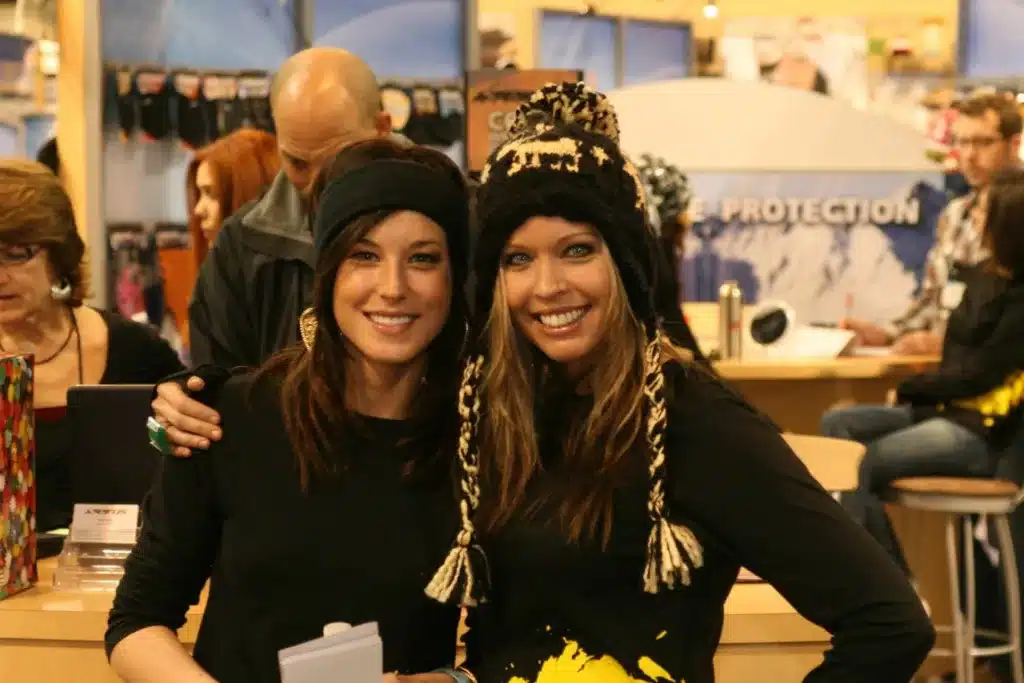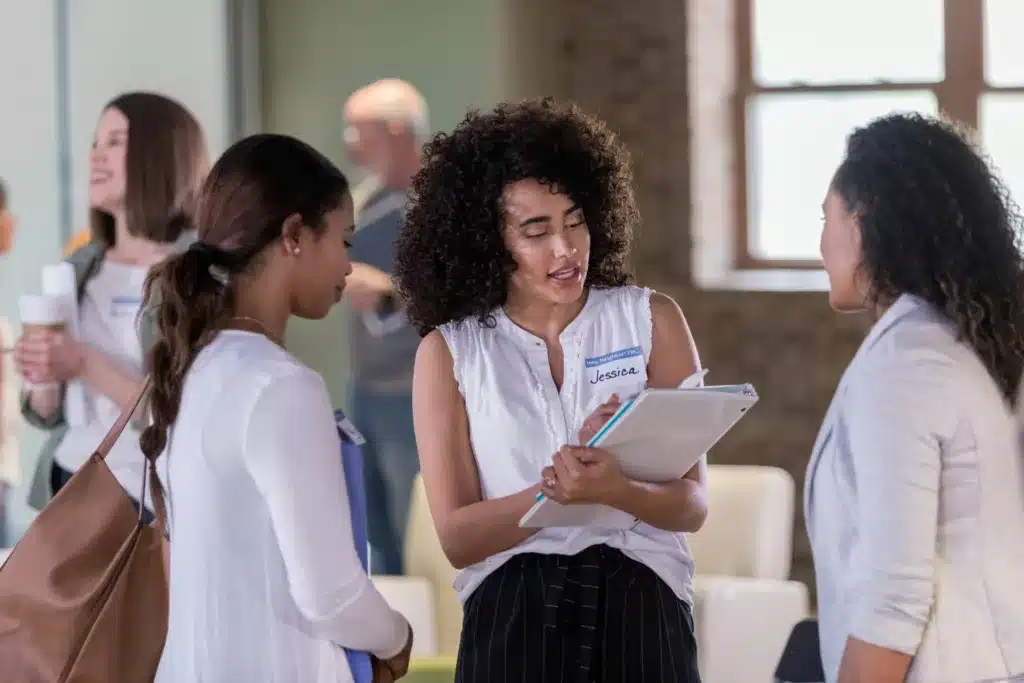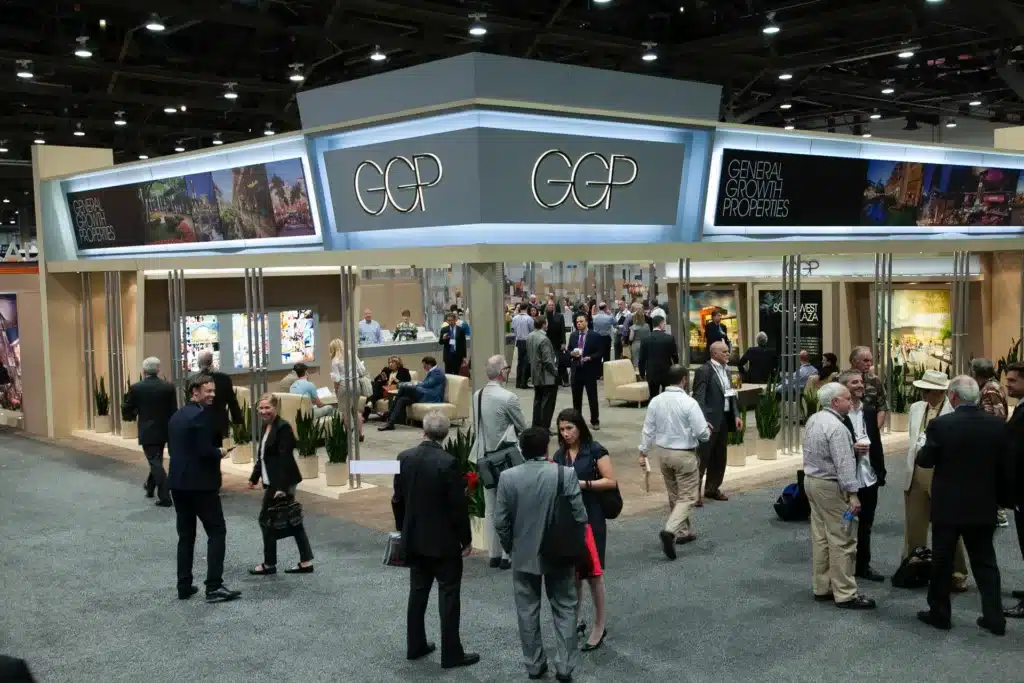Having the right trade show staff is critical for the success of your company’s participation in trade shows and exhibitions. The effectiveness of your staff at the trade show can directly impact your brand’s image, lead generation, and overall return on investment.
With that being said, here is a step-by-step guide on how to train your trade show staff for success.
Set Clear Objectives
It all starts with defining clear objectives for your participation in the trade show. Determine what you want to achieve. For example, it could be brand awareness, lead generation, or product launches.
Make sure the staff understands these objectives and how to achieve them.
Select the Right Team
When it comes to choosing your team, you want to make sure they have the necessary skills, enthusiasm, and knowledge about the products or services your business offers. Consider their interpersonal skills as they will be engaging with your potential clients.

Provide Pre-Show Information
Your team needs to have access to all the relevant materials and information before the trade show. This includes brochures, marketing materials, and even scripts for pitches.
Additionally, they should have all of the additional company and product information they need easily accessible within the exhibit during the show.
Etiquette Training
When it comes to etiquette, trade show staff should be well-versed so they leave a positive and professional impression on attendees.
Also, establish a dress code that aligns with your company’s branding and ensure that all staff members are dressed neatly and appropriately for the event.
Train your staff to smile and make eye contact which helps establish a connection with attendees. Train staff to also offer assistance without being too pushy. A simple phrase like, “How can I help you?” can prove to be very effective.
Handling Problems
Training trade show staff on how to handle problems and challenges effectively is important for ensuring a smooth and successful trade show experience.
Identify Potential Problems and Adopt a Problem-Solving Mindset
Discuss common problems that can arise during a trade show event, like technical issues, difficult attendees, competition, and other logistical hiccups.
You then need to instill a problem-solving mindset in your staff. This means to emphasize the importance of remaining calm and focused in the face of these issues and challenges.
With proper training, staff will be able to anticipate potential problems and have contingency plans in place. This means having backup materials, tools, and a plan for different scenarios.
Effective Communication
When a problem arises, trade show staff and contractors need to know how important clear and timely communications are.
This means being able to communicate to their team or management when problems or challenges arise so they can learn how to relay the proper solutions.
Consider implementing an end of day report or staff meeting to go over highlights and issues of the day.
Hierarchy of Resolution
During trade show staff training, you also need to establish a hierarchy of problem resolution.
Determine which staff members should handle different types of issues and when problems need to be escalated to higher authorities.
Technical Proficiency
If you have a trade show booth that relies on technology, then your staff should be well-versed in troubleshooting common technical problems. This can include problems with displays, audiovisual equipment, or lead capture systems.
Designating a specific person with the correct skills for this responsibility is ideal.
Handling Difficult Attendees
When training, try role-playing scenarios involving difficult attendees. Train your staff to remain calm, empathetic, approachable, and professional when dealing with challenging personalities.
Get started by coming up with some of the more common scenarios they might encounter. Here are some examples:
- An Aggressive Attendee: The attendee is visibly upset, raises their voice, or makes aggressive gestures. In this case, train your employees to stay calm and to listen actively to their concerns without interrupting. They can then emphasize with their frustration and validate the attendee’s feelings.
- An Overly Demanding Attendee: The attendee insists on receiving exclusive discounts or special treatment beyond what you can or are willing to offer. In this case, train your employees to politely explain the company’s limitations and policies and emphasize the value of what you can offer.
- An Intrusive or Unruly Attendee: If the attendee invades your booth space, disrupts conversations, or behaves inappropriately, train your employees to politely but firmly request that they respect your boundaries. If they continue to be disruptive, tell your employees to seek assistance from event security or one of the event organizers.
- A Negative or Dismissive Attendee: The attendee expresses negative opinions about your brand without actually giving it a fair chance. In this case, it is important to stay professional and courteous. Train your employees to ask open ended questions and share positive testimonials or success stories.
- An Excessive Time Waster: The attendee is monopolizing your employee’s time with extensive questions or conversation that doesn’t pertain to your booth or brand. What do you do? Politely and respectfully manage their time, offer to answer their questions briefly, and suggest they stop by again later for a more in-depth conversation.
Training for Main Goals and Strategies
The main goal of trade show staff training is to ensure that your team is well-prepared, knowledgeable, and fully capable of representing your company effectively during trade shows.
The ultimate goal is maximizing trade show success by achieving your objectives, which may include lead generation, brand promotion, and customer engagement.

Lead Generation
Train staff to capture high-quality leads by engaging with attendees and collecting contact information. This helps you build a more robust pipeline of new customers for your business. You can use digital tools for email collection or collect business cards.
Brand Promotion
Staff should be able to effectively communicate your brand’s value proposition, messaging, and unique selling points. This creates brand awareness and leaves a lasting impression on attendees.
Product Knowledge
Your team should have in-depth knowledge about your products or services so they can answer questions, provide demonstrations, and highlight key features and benefits.
Engagement and Interaction
Staff should be trained in techniques for engaging attendees, initiating conversations, and making connections that will last beyond the event.
Problem Resolution
As mentioned earlier, you need to have strategies in place for your team to handle unexpected challenges and problems that might arise.
You also need to ensure that each employee has comprehensive knowledge of your brand and effective communication skills.
Conflict resolution training that includes strategies for de-escalating tense situations, finding common ground, and reaching mutually acceptable solutions are all good things to include in training.
Role playing exercises allow employees to practice handling different scenarios and allows them to train in a controlled environment.
Escalation procedures should also be in place to show employees how to escalate issues to a higher authority within your organization.
Finally, feedback and evaluation is a good way to gather feedback from employees about their experiences with problem resolution and you can then use this feedback to improve your training programs.
Lead Qualification
Staff should also know how to qualify leads. This means having an understanding of the needs, budgets, and buying intent of the attendees. It helps prioritize follow-ups on your most promising leads.
When it comes to developing winning strategies, comprehensive training, having clear objectives, and continual learning are all important aspects to consider when training trade show staff for success.
Setting clear goals and implementing effective training strategies empowers trade show staff to succeed while also contributing to the achievement of all of your trade show objectives.

Staff Training Ideas
Here are examples of some tailored approaches you can take when training specific staff members that include classroom instruction, online courses, and video conferences.
- Greeters: Conduct in-person role-playing sessions where they can practice greeting and initiating conversations.
- Presenters: In-person workshops and online courses for presentation and booth design and storytelling techniques.
- Sales Representatives: In-depth classroom training on sales techniques, online courses regarding sales psychology, or a video conference for role-playing.
- Demonstration Specialists: In-person sessions to ensure demonstration specialists have a deep understanding of the products or services, online courses that cover the technical aspects of a product, and video conferences to simulate live demonstrations.
How to Train and Manage Remotely
Training and managing remotely means there needs to be careful planning and effective communication and follow-up.
Video conferencing tools can be used to conduct pre-event training sessions, and online resources like training videos and documents can be provided.
Clearly define roles and responsibilities for each remote staff member and assign tasks related to lead generation, product demos, or attendee engagement. You can also create digital training materials to share electronically with remote staff.
Finally, conduct virtual role-play sessions to practice engaging with attendees.
When to Hire People With Special Skills That Can’t Be Easily Trained
Hiring people with special skills that cannot be easily trained is sometimes essential for trade show events in different scenarios.
For example, you require a greater degree of technical expertise, intricate or highly technical product demonstrations, multilingual or cultural expertise, or subject matter experts.
When hiring these experienced people, you need to consider your budget, specific needs, and the potential return on investment (ROI). In many cases, the expertise these individuals bring can enhance your booth’s effectiveness and ultimately contribute to the success of your trade show participation.
If you need help hiring staff for your next trade show event in Las Vegas, contact Expo Ease to help bridge the gap and discuss all your staffing needs.
